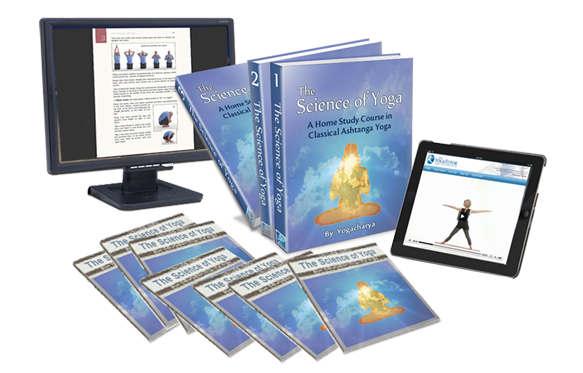[ Excerpt from The Science of Yoga, page 378 ]
The absence of unhappiness does not necessarily suggest the presence of happiness. Happiness, or contentment, is a positive trait which calls for active cultivation.
As a practical mode of training, one must begin by deciding to transform whatever happens to the better—and always be content with other people and events. This is a preliminary conscious effort of the mind. Yes, it is the same annoying little saying, "always look on the bright side of things." But if one refuses, at the very least to do even this, then how can one expect any illumination (of consciousness) from existing on the dull (darkened) side of life? So, in this way, it is useful to create in meditation, an image of oneself as a content and happy person who always sees the beautiful part of things.
Santosha also involves living in the present. It is imperative to accept with joy whatever life offers here and now, without uselessly spending energy living in regrets (or joys) of the past or fantasizing about the future. There is little time or energy available for such trite mental activity when one aspires to conquer their negative moods with positive ones.
The right attitude to have is quite simply a hopeful or optimistic one. At the very least, one’s attitude should be neutral. In this state, we join the positive streams of Universal energy. So, the typical yogic wisdom is to 'live in the present'. Again, these are more efforts of the conscious mind, but in repeatedly performing them, we slowly lay down patterns within our sub-consciousness that function to ultimately over-ride our negative conditionings.
However, the ultimate source of contentment resides with the complete eradication of desire at the subconscious level. This necessitates acute self-awareness, purification, mental discipline, understanding of the cause and effect relationships (karma), and all that we have engaged in within our exploration of yoga up until this point (along with much yet to come) to abolish the subconscious hold upon our minds and attitudes.
"The cultivation of the supreme contentment and consequent tranquillity of the mind is the result of prolonged self-discipline and going through many experiences which involve pain and suffering. It cannot be acquired by a mere assertion of the will once and for all. Habits developed through enumerable lives cannot be changed all at once. That is why constant alertness and training of the mind in maintaining the right attitude is necessary and that is why this virtue is placed under the Niyama."
~ I.K. Taimni, The Science of Yoga
[Continued...]
---------------------
NOTE: This yoga article is an excerpt from The Science of Yoga, an online yoga training program with streaming yoga videos and 600 pages of step-by-step yoga instruction.

"The Science of Yoga is a course worthy of
leather binding and an honored place in the
finest libraries in the world
... It is indeed a masterful work."
Dr. John Michael Christian
AwakeningWithYoga.com
Learn More About
The Science of Yoga Course
|






